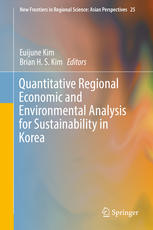

Most ebook files are in PDF format, so you can easily read them using various software such as Foxit Reader or directly on the Google Chrome browser.
Some ebook files are released by publishers in other formats such as .awz, .mobi, .epub, .fb2, etc. You may need to install specific software to read these formats on mobile/PC, such as Calibre.
Please read the tutorial at this link: https://ebookbell.com/faq
We offer FREE conversion to the popular formats you request; however, this may take some time. Therefore, right after payment, please email us, and we will try to provide the service as quickly as possible.
For some exceptional file formats or broken links (if any), please refrain from opening any disputes. Instead, email us first, and we will try to assist within a maximum of 6 hours.
EbookBell Team

5.0
18 reviewsThis book focuses on the application of newly innovated analytical tools for sustainable development on regional economic and environmental issues in Korea. With a range of case studies, the authors explore a series of theoretical models and empirical methods including spatial CCE Model, multiregional Input-Output and econometric analysis, logit model, contingent valuation method, GIS, sample selection model, machine learning technique, stochastic frontier analysis, and panel analysis. These models and methods are tailored to spatial development issues such as agglomeration, clustering and industrial innovation, human capital and labor market, education and R&D investments and economic resilience for regional economies and unexpected disaster, and natural resources for environmental markets. Quantitative Regional Economic and Environmental Analysis for Sustainability in Korea is of particular interest to policy makers and practitioners, as well as research scholars active in sustainability science.